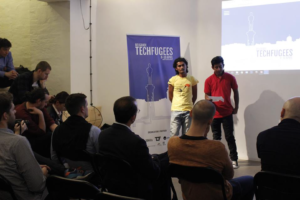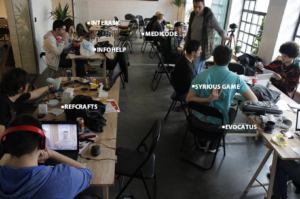
First, you open the door.
When organising Techfugees Belgrade hackathon in April, we were in a specific position: Belgrade is on the Balkan route, parks were flooded with refugees (thousands were passing through, daily) and the tech community wanted to offer some help. We kept one thing in front of our eyes at all times: The crisis is understood only by the ones involved in it.
It is kind of comfortable looking at it from the outside- one can easily fall into a trap of making amazing things that no one on the crisis field needs. That is why we made sure to talk to refugees directly and to the volunteers that worked on the spot – to learn what are the real problems of the people affected by the biggest human exodus since the WW2.
There was a true disaster at our doorstep. So we invited refugees in – the coworking Startit center space, for the next 48 hours became the place of human understanding and technology-inspired change.
Next, you listen: Long routes, vulnerability, lack of information and Wi-Fi access
These people were not travelling, they were running away across continents and seas with whomever they could bring along and with whatever they could carry.
The lack of vehicles, food or water was rarely mentioned (although it was obviously there) however, the lack of information, organizing volunteers at the times of need, issues with roaming, information coming in too late, impossibility to get to information or to call for help in between the shelters were always mentioned.

So the high-tech peeps needed to think in terms of no tech! No Wi-Fi, border crossings, new languages, old and new sim cards, violence happening along the route, rain, wind, exhaustion… We needed to go low-tech or, rather real-tech, and to connect the solutions to all the real aspects: suffering while constantly being on the go. With the help of amazing people from InfoPark and Refugee Aid Miskalište we worked with refugees directly.
One team addressed a tough question – how can technology ease the problem of lack of information and communication on the go?
Then you ask: How to have mobile information available everywhere and at all times?
That sounds almost impossible. However, there were things hiding in plain sight.
Low-tech solution- USSD protocol works on the field, without Internet, and it is easily accessible from any kind of phone. So why not use this almost forgotten technology to solve the current problems?
This is how InfoHelp was born – we created a fully offline, USSD communication project for refugees that works on any kind of a mobile phone- providing info without the need for the internet.
And then you build: The country’s telecom is an essential partner
Telekom Srbija, the largest national telecom operator has agreed to join us in this effort and provide the free USSD access and the dedicated number *303#, also for free.
It works like this: *303# is a number a refugee can dial, and specific information (location, nearest Wi-Fi, shelter, food, type of food) are available always and offline, and on any type of phone everywhere in Serbia. Through this number, another important service can be made available: refugees can report violence on the spot – when it happens. This service will be made available in cooperation with NGOs and international organisations specialising in the field of violence prevention.

Where we are now and our next steps
InfoHelp team is currently in the process of signing the contract with Telekom Serbia to make InfoHelp happen in Serbia. We would love to get in touch with Greek telco and we are also in talks with Pakistan, Italy and few other countries. Our aim is to help countries where the influx of refugees is large, and the smart ways of sharing information is much needed.
Join our efforts, contact us with ideas and/or contacts on infohelp303@gmail.com
Also, have a look at other solutions developed during the Techfugees Belgrade hackathon.
The event would have never happened without the help from our people at InfoPark, Miksalište Refugee Aid, Startit Center, WAHA and 30 Hills.
By Katarina Popović, InfoHelp founder